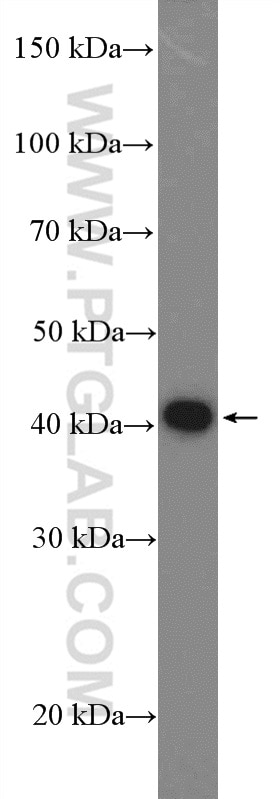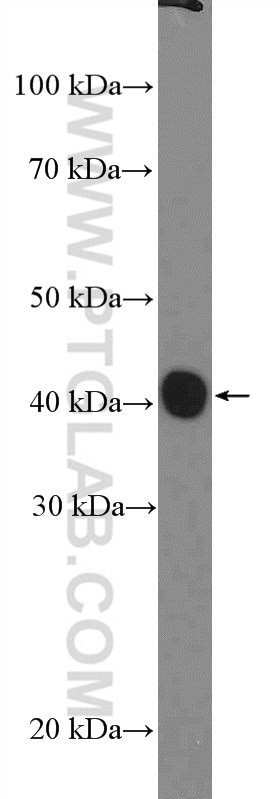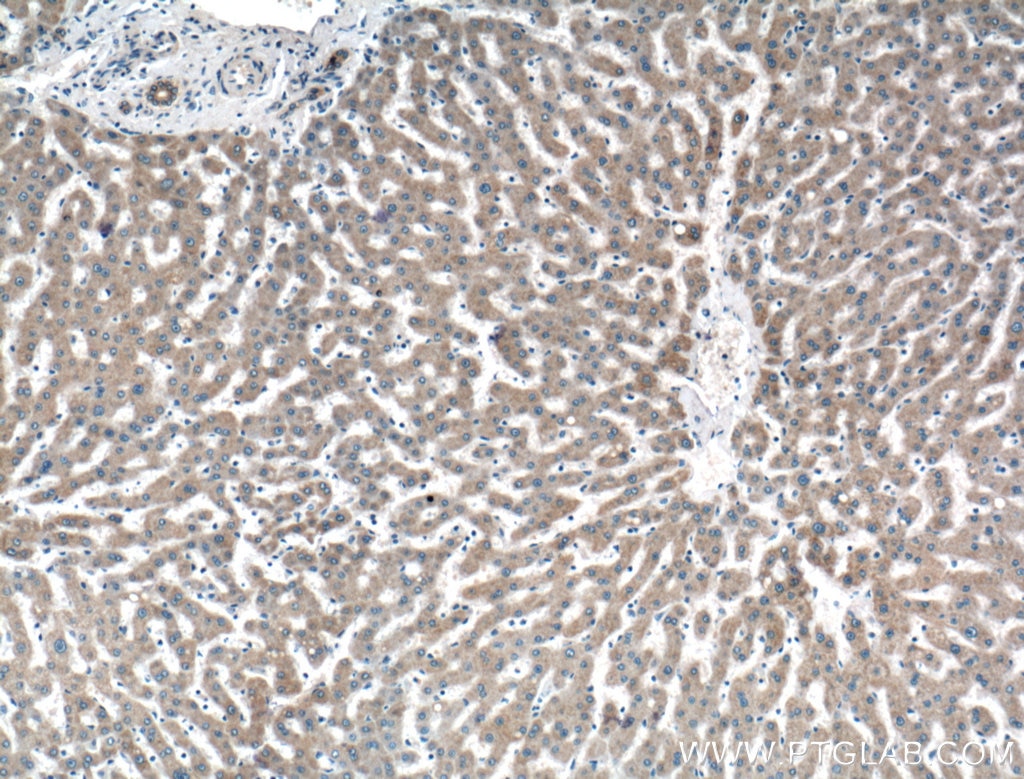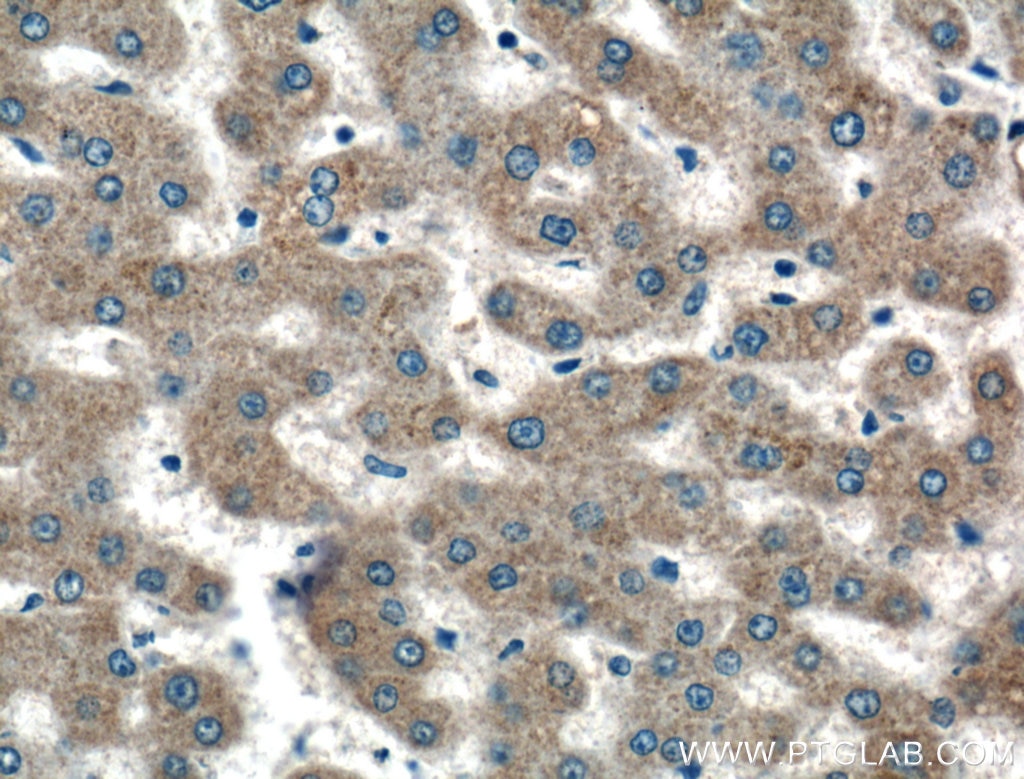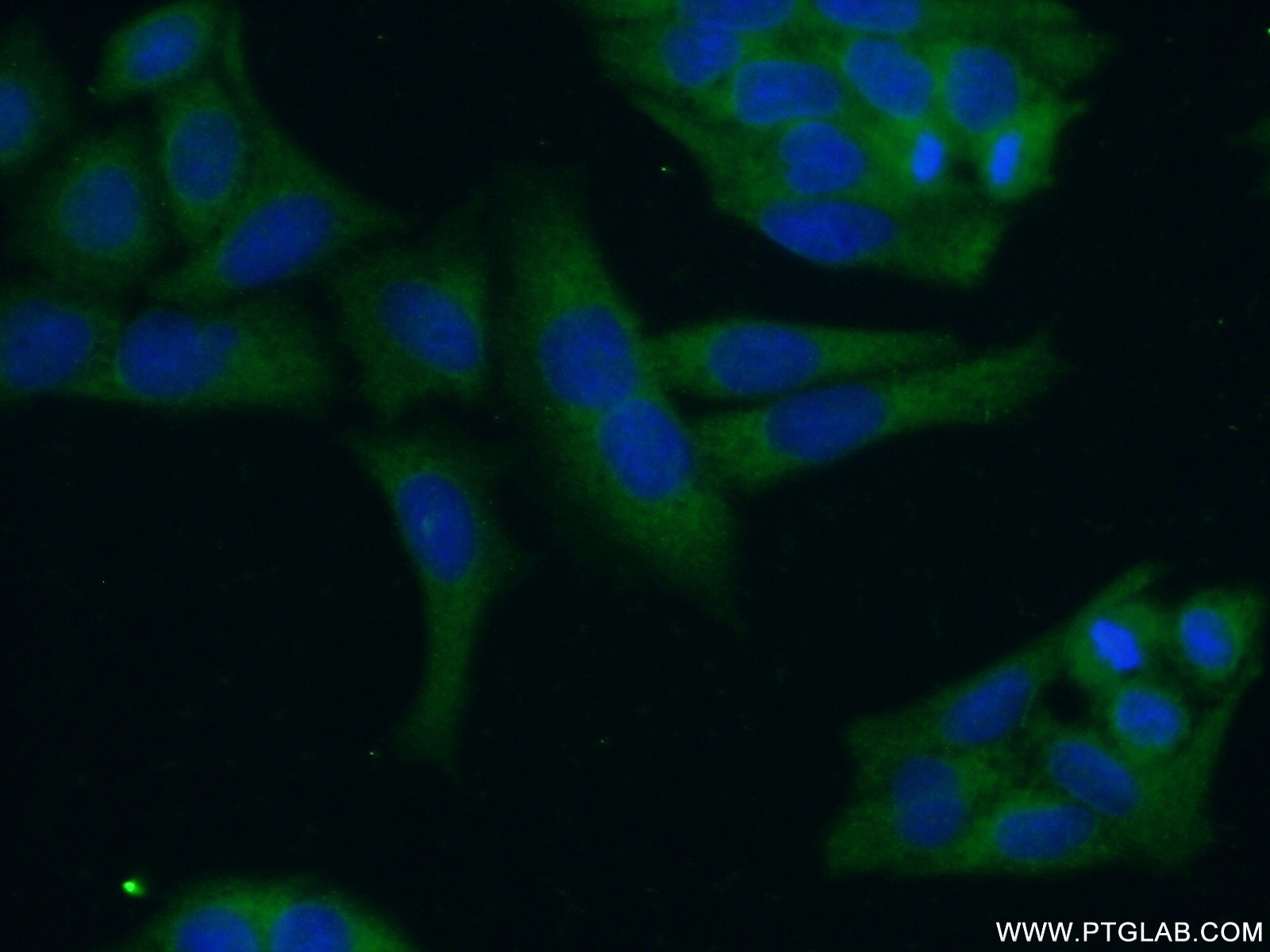- Featured Product
- KD/KO Validated
PRAS40 Polyklonaler Antikörper
PRAS40 Polyklonal Antikörper für WB, IHC, IF/ICC, ELISA
Wirt / Isotyp
Kaninchen / IgG
Getestete Reaktivität
human und mehr (1)
Anwendung
WB, IHC, IF/ICC, ELISA
Konjugation
Unkonjugiert
Kat-Nr. : 21097-1-AP
Synonyme
Geprüfte Anwendungen
| Erfolgreiche Detektion in WB | MCF-7-Zellen, HeLa-Zellen |
| Erfolgreiche Detektion in IHC | humanes Lebergewebe Hinweis: Antigendemaskierung mit TE-Puffer pH 9,0 empfohlen. (*) Wahlweise kann die Antigendemaskierung auch mit Citratpuffer pH 6,0 erfolgen. |
| Erfolgreiche Detektion in IF/ICC | HeLa-Zellen |
Empfohlene Verdünnung
| Anwendung | Verdünnung |
|---|---|
| Western Blot (WB) | WB : 1:500-1:2000 |
| Immunhistochemie (IHC) | IHC : 1:50-1:500 |
| Immunfluoreszenz (IF)/ICC | IF/ICC : 1:50-1:500 |
| It is recommended that this reagent should be titrated in each testing system to obtain optimal results. | |
| Sample-dependent, check data in validation data gallery | |
Veröffentlichte Anwendungen
| KD/KO | See 1 publications below |
| WB | See 3 publications below |
| IF | See 1 publications below |
Produktinformation
21097-1-AP bindet in WB, IHC, IF/ICC, ELISA PRAS40 und zeigt Reaktivität mit human
| Getestete Reaktivität | human |
| In Publikationen genannte Reaktivität | human, Maus |
| Wirt / Isotyp | Kaninchen / IgG |
| Klonalität | Polyklonal |
| Typ | Antikörper |
| Immunogen | PRAS40 fusion protein Ag15355 |
| Vollständiger Name | AKT1 substrate 1 (proline-rich) |
| Berechnetes Molekulargewicht | 27 kDa |
| Beobachtetes Molekulargewicht | 40 kDa |
| GenBank-Zugangsnummer | BC051844 |
| Gene symbol | PRAS40 |
| Gene ID (NCBI) | 84335 |
| Konjugation | Unkonjugiert |
| Form | Liquid |
| Reinigungsmethode | Antigen-Affinitätsreinigung |
| Lagerungspuffer | PBS with 0.02% sodium azide and 50% glycerol |
| Lagerungsbedingungen | Bei -20°C lagern. Nach dem Versand ein Jahr lang stabil Aliquotieren ist bei -20oC Lagerung nicht notwendig. 20ul Größen enthalten 0,1% BSA. |
Hintergrundinformationen
PRAS40 (40 kDa proline-rich AKT substrate) is also named as AKT1S1 (Proline-rich AKT1 substrate 1). PRAS40 is a substrate of Akt and a component of the mammalian target of rapamycin complex 1 (mTORC1) (PMID: 28978182). Locating at the crossroad of the PI3K/Akt pathway and the mTOR pathway, PRAS40 is phosphorylated by growth factors or other stimuli, and regulates the activation of these signaling pathways in turn (PMID: 28978182). PRAS40 is expressed in a variety of tissues in vivo and has multiple phosphorylation sites, which its activity is closely related to phosphorylation. Studies have shown that PRAS40 is involved in regulating cell growth, cell apoptosis, oxidative stress, autophagy and angiogenesis, as well as various of signalling pathways such as mammalian target of mammalian target rapamycin (mTOR), protein kinase B (PKB/Akt), nuclear factor kappa-B(NF-κB) proto-oncogene serine/threonine-protein kinase PIM-1(PIM1) and pyruvate kinase M2 (PKM2) (PMID: 33504218).
Protokolle
| PRODUKTSPEZIFISCHE PROTOKOLLE | |
|---|---|
| WB protocol for PRAS40 antibody 21097-1-AP | Protokoll herunterladen |
| IHC protocol for PRAS40 antibody 21097-1-AP | Protokoll herunterladenl |
| IF protocol for PRAS40 antibody 21097-1-AP | Protokoll herunterladen |
| STANDARD-PROTOKOLLE | |
|---|---|
| Klicken Sie hier, um unsere Standardprotokolle anzuzeigen |
Publikationen
| Species | Application | Title |
|---|---|---|
Nat Commun Hypothalamic SLC7A14 accounts for aging-reduced lipolysis in white adipose tissue of male mice | ||
J Neuroinflammation Sexually dimorphic extracellular vesicle responses after chronic spinal cord injury are associated with neuroinflammation and neurodegeneration in the aged brain | ||
Front Oncol The Molecular Landscape and Biological Alterations Induced by PRAS40-Knockout in Head and Neck Squamous Cell Carcinoma.
| ||
Mol Cell Oncol Silencing Glypican-1 enhances the antitumor effects of Pictilisib via downregulating PI3K/Akt/ERK signaling in chemo-resistant esophageal adenocarcinoma |
